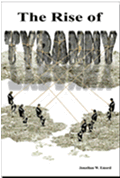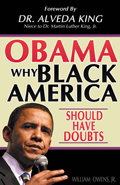By
Marilyn M. Barnewall
March 22, 2010
NewsWithViews.com
How “They” Do “It”
Last week, when NewsWithViews was unable to send email notices about new stories for a few days, Kelleigh Nelson wrote a very interesting story titled “Beware of Infiltration by ‘Controlled’ Opposition.”
Her story provides information about how various people’s celebrity is used to prevent We, the People from making needed political changes.
The following article hits closer to home. It covers an actual takeover of five (5) Tea Party groups and how it was done – so subtly that some members of these groups do not yet realize how they have been manipulated. It offers a warning.
When your Tea Party group decides to support a political candidate, who makes the decision? Tea Party members? Or, a majority of the group’s Board of Directors – a handful of people?
My March article about the hijacking of the Tea Party movement by Republican and Democrat party pirates got some interesting responses.
I found out how Tea Party groups lose control. If you’re a Tea Party member, the information might help keep your enemies on the radar screen.
First, let’s deal with a definitional issue. ‘Control’ and ‘Power’ are two words that are quite different and are frequently used incorrectly. Since these words are important to this article, let me offer my definitional differences.
Control happens behind your own nose – in your own body. It is internal. You control what you think and eat, when you sleep, what clothes to wear, how often you brush your teeth, what city and state you live in, who and when you marry, and a lot of other things. You still have the right to control these things.
That “right to control” leads to the definition of “power.” As control is exercised behind your own nose, power is exercised behind the noses of others.
Power is external. Others exercise it over you. You control what you eat (really?). You can sleep when you want – but your employer tells you what hours to work. You wear clothing you like (can afford). You can live where you want – if jobs are available. You marry when and to whom you choose – provided someone says “yes.”
When you hear “they are trying to control you,” what is really meant is “they are trying to exercise power over you.” No one controls you unless they hold power over you.
The more “advanced” our society becomes the more difficult it is to control our own destiny. When a law is passed saying you must have a prescription to buy certain dosages of vitamins (as has been done in many European cities), you have a choice. You can accept the law and obey ‘them’. Or, you can do without vitamins; or, you can buy vitamins unlawfully. If you’re caught, you’ll be punished. Power is usually accompanied by force – or, the threat of it.
You have a choice to make. Comply? Or, disobey?
Is this control? Or, does external power motivate your decision? If someone holds no power over you, they can’t control you.
When an outside entity ‘controls’ your behavior using the power of employment, imprisonment, life with no mate, or if you live in a city you dislike because jobs are available there – it is power, not control, influencing your decisions.
The difference between the two words is very subtle, but it makes a huge difference in how we react to things.
It is the subtlety of how power is exercised by entities that want control over others that causes freedom to slip into a dark fog one inch at a time.
I was surprised when someone shared with me the Bylaws of a Tea Party consortium – an alliance of several Tea Party groups that joined together under the umbrella of a single organization. I was even more surprised when I read the changes made to Bylaws by their newly elected Board. They established a group name, but each Tea Party group was to maintain independence.
First, the Board changed the title of the consortium’s “Constitution” as written by members of the individual groups. The Board re-named it ‘Bylaws’. It’s a little like the attitude politicians have toward the Constitution. Like politicians, this Board knows it, on its own, can change ‘Bylaws’. A Constitution, however, requires the will of members to change it.
Under the consortium’s Constitution, members had to be American citizens to join. Board members didn’t wait long to change that. Now, anyone who is a resident of the State can join, legal or illegal.
The old Constitution of this Tea Party consortium used to require a quorum of one-fourth its total membership for a legitimate group vote. Well, the Directors couldn’t have that so now all it requires is a quorum of Board votes. As few as four (4) people can vote – to support specific political candidates, for example.
This group, supposedly representing responsible freedom, doesn’t know how to define it, do they? Definitions differ. When some say “freedom” they really mean “tyranny.” If this sounds to you like a conservative group, you do not understand the definition of a Conservative when compared to party politician, Liberal, Republican and Democrat.
Among the “powers” the Board claims on behalf of its members is to establish and oversee activities approved… by the Board, of course. It can adopt and amend the Bylaws by a two-thirds vote of the Board. Tea Party members needn’t worry about such things. Sounds like this Board doesn’t want to be hampered by member participation in the decision-making process? Isn’t that the precise problem people have with our political process now? Why bother joining a group to get what you already have?
As in much of the country last week, members of both primary political parties in America went to their local precincts to elect delegates who will nominate their Party’s candidates. This ‘conservative’ group of ‘Board members,’ not its members, voted for its preferred candidates. That’s not conservative behavior.
As one might predict, it gives a boost to candidates when the general public reads newspapers and internet articles of a Tea Party group announcing ‘its’ support.
Did the Board of Directors of this group inform the public that it only took the votes of a handful of Board members to gain this consortium’s support? Gee, I don’t recall reading that in its release. It was probably a mistake… yes?
You will contain your surprise to learn the nominees the group supports are the same ones supported by – I’ll be doggoned: the Republican Party! The same political hacks with an arm poised to stamp legislative seals of approval on anything the GOP asks of them. The people: Who are they? Stunning news!
At the group’s Web site, members have access to resources galore. Members are told to go there for help. They are the same old resources that have been giving advice to the GOP for years. They help members contact government offices, the State Republican Party, Republicans at national levels – I thought the purpose of the Tea Party was to reject the “same old thing.”
The Republican Party in this town hijacked the consortium of Tea Parties. This scenario is likely being replayed by both political parties in all states with active Tea Parties.
Are the GOP and Democrat Parties aware of this? Who, other than an old friend named Common Sense (who died recently), will say?
How does this happen? Why do people elect to office those who are driven to attain power?
First, anyone not driven by power doesn’t want to immerse himself in managing a group of political activists. It takes time. All people have better things to do with their time – but we must also be careful how we define ‘better’.
What’s ‘Better’ than independence? ‘Better’ than freedom? ‘Better’ than maintaining control of groups capable of bringing principled leadership back to your country? Is withdrawing from the political process ‘Better’ than losing your health care, and our Constitution, and our country?
The ugly truth is, conservatives do not need touchy, feely forms of group therapy to have a sense of purpose and meaning. That’s why so few conservatives run for political office. They do not need a ‘power’ rush that comes from ‘controlling’ the actions of others. Political groups do that.
Conservatives have leadership traits. They also have no personal desire for power or to do what must be done so “control” can keep “power” caged. Liberals, on the other hand, are driven by the need for power over others. The best of examples of this kind of arrogance head the U.S. House of Representatives and U.S. Senate, pushing unlawful health care legislation through the process – and doing it unlawfully, to boot!
After 20 years of research and the conclusions reached, I've often asked why, throughout history, there was one group of people motivated to control their own destinies and another that needed to exercise power over the destiny of others.
| Subscribe to the NewsWithViews Daily News Alerts! |
Since human beings walked out of the cave, they have fought to either control their own destiny or sought the power to control the destiny of others. The “control my own destiny” group lacks the desire for power, and the “must have power” group lacks the discipline to use it wisely.
Individualists who love personal freedom and accept responsibility for it know better. They become activists and join Tea Parties. They become leaders who use power wisely: for the people rather than against them.
� 2010 Marilyn M. Barnewall - All Rights Reserved
Sign Up For Free E-Mail Alerts
Marilyn Barnewall received her graduate degree in Banking from the University of Colorado Graduate School of Business in 1978. She has authored seven non-fiction books about banking, two are listed at Oxford and Cambridge University libraries in Great Britain. Her current book, When the Swan’s Neck Breaks, details the banking problems she foresaw in 2006. Of the 24 predictions made in the book, 22 have happened. It is fiction but readers refer to it as docu-fiction.
Barnewall was named one of America's top 100 businesswomen in the book, What It Takes (Dolphin/Doubleday; Gardenswartz and Roe) and was one of the founders of the Committee of 200, the official organization of America's top 200 businesswomen. She can be found in Who's:Who in America (2005-08), Who's Who of American Women (2006-08), Who's Who in Finance and Business (2006-08), and Who's Who in the World (2008).
Web site:
E-Mail: marilynmacg@juno.com
















